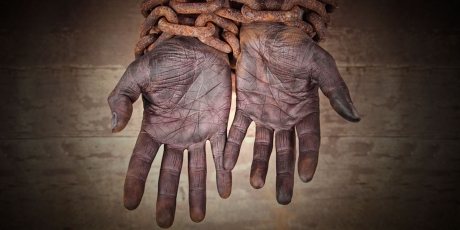- About
- Topics
- Picks
- Audio
- Story
- In-Depth
- Opinion
- News
- Donate
-
Signup for our newsletterOur Editors' Best Picks.Send
Read, Debate: Engage.
| September 27, 2017 | |
|---|---|
| topic: | Slavery |
| tags: | #slavery, #mauritania, #Anti slavery |
| located: | Mauritania |
| by: | Bob Koigi |
Yet these are a microcosm of an age old practice of slavery that has been so entrenched in the country that out of a population of 3.8 million, up to 43,000 people are said to be slaves according to Walk Free Foundation's Global Slavery Index. The cries and anguish of the slaves are hushed by the heavy sand dunes in the desert country where the government has paid lip service to legislation that criminalizes slavery.
It is a practice that has been particularly entrenched due to the caste based society that embraces and labels people of certain tribes and class as naturally-born slaves. They seem to have accepted it. One such group, the Haratin, a minority, receives no pay for any work they do and are owned by their masters right from birth. They receive little or no education and their women are subjected to frequent rape by their masters. The children that are a product of the rape also become the property of the slave owner.
With over three-quarters of Mauritania covered by the Sahara Desert, the country remains dry and drought-stricken which has also fanned slavery with families worshipping a select number of well-moneyed masters for even a plate of food.
Although cases of slavery have dropped to some extent, there has been no goodwill from the government and the institutions of authority to outrightly condemn it. The country, for example, was the last in the world to abolish slavery in 1981 but only introduced a law to punish perpetrators in 2007. It becomes one of the three countries, with Mali and Niger, where slavery by inheritance has refused to die.
But amid the sorry state of affairs voices of reason have actively campaigned against the vice while providing safe haven to those freeing the torture of slavery. One such voice is Salimata Lam, a mother of four who doubles up as the national coordinator for S O S Esclaves, a premier anti-slavery institution founded in 1995 and which has been at the forefront of campaigning against modern-day slavery.
Behind the scenes, Lam has actively been involved in organizing for escaped slaves to find a safe haven at SOS Esclaves. They are usually mothers and children. She talks to them on a personal level, trying to transition them from slavery to freedom.
At the safe haven, the former slaves are given key skills like cookery, tailoring, hairdressing and embroidery, skills that are important for them to start thinking of jobs and deconstruct from them the mentality that they were born slaves and will die at the mercy of their masters.
It is a job however that comes with its fair share of risks and Lam and his colleagues have put their lives on the line protecting the former slaves. They are often followed by government operatives and in some instances, her fellow activists have been arrested and convicted on flimsy charges like being members of an unrecognized institution. Still, Lam’s resolve has never waned.
Her ultimate dream has been to see a country whose citizenry is free. Through on-ground rescue operations and advocacy while working with anti-slavery movements across the world, she hopes to change the narrative someday. “SOS Enclaves is one of the most vocal institutions on matters of slavery. Their voices together with those of other organizations like Anti-Slavery International especially in the areas of providing legal services to victims, working with policy makers to keep government in check and putting a lot of pressure on the international community has made a marked difference in the war on slavery in the country.
Even the United Nations now has its ears on this issue,” said Donald Mugisha a human rights lawyer who has extensively worked on the anti-slavery campaign across Africa.
With convictions of former powerful masters now becoming a reality and victims getting compensation in an unprecedented development in the country’s history, the voices of Lam and other activists crying from the heart of the desert are finally paying off.
By copying the embed code below, you agree to adhere to our republishing guidelines.
